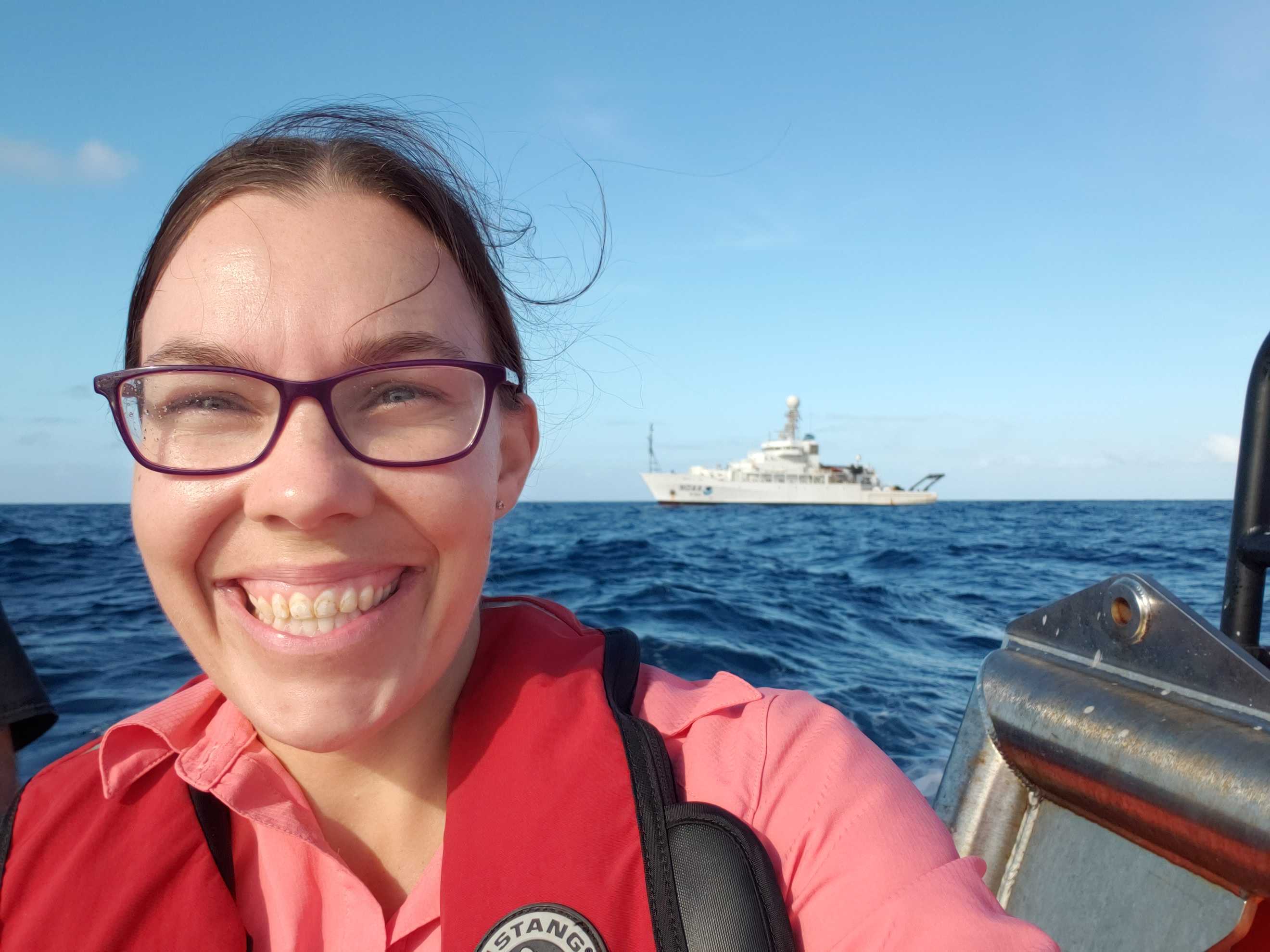
Our internationally recognized students, staff and faculty are committed to advancing our leading-edge research and scholarship toward the present and future sustainability of global systems. This challenge is made ever more important by the dynamics of climate change and the concurrent changes in large-scale weather patterns. Through open communication and continuous collaboration, we engage individual perspectives to meet such challenges of regional and global significance. Meeting these challenges is a community effort and makes us all a part of something much greater. Through action in training, learning, research and service, we embody the greatness that is central to the University of Oklahoma.

Students with the Department of Geography and Environmental Sustainability join a community of interdisciplinary scholars driven to comprehend the Earth's human–natural systems. With nearly two dozen faculty, expertise on the physical and humanized earth runs the gamut from technical and field-based science to critical-theoretical and geohumanist perspectives. DGES also offers an online Geospatial Technologies MS program.
The M.A. in Geography and Environmental Sustainability degree is designed to give students a professional grasp of the concepts and techniques of geography. The M.A. degree can be completed with or without a thesis.
The thesis option requires 30 semester hours of graduate credit. Coursework requirements include satisfactory completion of Contemporary Geographical Thought (6973); Research and Writing in Geography (6953); two graduate-only seminars offered by the Department, and a minimum of four hours and no more than six hours of thesis credit. In addition, the student must write a thesis acceptable to the advisory committee and defend it orally.
The non-thesis option requires a total of 36 semester hours of graduate credit. Coursework requirements include satisfactory completion of Contemporary Geographical Thought (6973); Research and Writing in Geography (6953); and two graduate-only seminars offered by the Department. In addition, the student must pass a comprehensive final examination.
Degree Requirements
The M.S in Geography Environmental Sustainability provides training to qualified graduates with advanced education in physical and environmental geography to meet the demands of the state in the public and private sectors. Graduates obtaining the Master of Science in Geography will be trained to become experts in spatial analysis and leaders in research, decision-making, and policies that guide the governance and management of our environmental resources.
There are two tracks offered in both the thesis and non-thesis option of this program, one focusing in Environmental Systems and one focusing in Geospatial Technologies. Students in both the thesis and non-thesis options may choose a series of courses from a list of guided electives. Students completing a thesis will take 15 hours of guided electives (which includes 6 thesis hours); those in the non-thesis path will take 15 hours of guided electives without the thesis hours. Guided electives will be selected by the student under guidance of her/his advisory committee.
The thesis option is ideal for students considering a Ph.D. at a later date and requires 30 semester hours of graduate credit. Coursework requirements include satisfactory completion of Contemporary Geographical Thought (GEOG 6973); Research Methods in Geography (GEOG 6953); and Spatial Statistics (GIS 5923) with a minimum of four hours and no more than six hours of thesis credit. In addition, the student must write a thesis acceptable to an advisory committee and defend it orally.
The non-thesis option requires a total of 33 semester hours of graduate credit. Coursework requirements include satisfactory completion of Contemporary Geographical Thought (GEOG 6973); Research Methods in Geography (GEOG 6953); and Spatial Statistics (GIS 5923). In addition, the student must pass a comprehensive final examination.
Degree Requirements
The Ph.D. program is designed to provide students with a high degree of professional competence in geography, including an important, original contribution to knowledge. The Ph.D. degree requires at least 90 semester hours of graduate credit beyond the bachelor’s degree. Up to 44 semester hours of previous graduate coursework can be applied to these 90 hours upon approval of the student’s advisory committee and the Graduate College. Coursework requirements include satisfactory completion of Contemporary Geographical Thought (6973), Research and Writing in Geography (6953), and two graduate-level seminars offered by the Department. Ph.D. students must also present a doctoral dissertation proposal approved by the student’s advisory committee, pass the written and oral portions of the General Examination, and complete and defend a written dissertation.
Degree Requirements
From aerial and satellite remote sensing imagery to the Global Positioning System, computerized geographic information systems are revolutionizing the way business, science, and government policy are carried out. Geospatial technologies have become a driving force for decision-making across the globe.
With the mission to foster insights, technical skills, and advanced training in geospatial technologies, the College of Atmospheric and Geographic Sciences and the Department of Geography and Environmental Sustainability at the University of Oklahoma offer the online Master of Science in Geospatial Technology* program. Representing the intersection of geography and technology, the program's curriculum was specifically designed to provide students with the theoretical and practical geospatial technology skills needed to advance in this rapidly growing field of study. An advanced degree from OU in geospatial technologies prepares you to leverage new technologies to support governmental, environmental, business, and societal decision-making affecting the future of our planet.
The online M.S. in Geospatial Technologies program is 33 credit hours and can be completed in 21 months.
Program Benefits
*The full name of the degree program is an online Master of Science in Geography and Environmental Sustainability with a concentration in Geospatial Technologies. Graduates of the program will receive a Master of Science in Geography and Environmental Sustainability diploma.
Click here to learn more about the OU Online, Geospatial Technologies MS program.
Geospatial technology is so prevalent nowadays that we rarely think about its use anymore. However, it is almost impossible to imagine a world without Google Maps, Yelp, and other location-based services that are currently available on most smartphones and other devices. The Department of Geography and Environmental Sustainability offers an embedded program to help meet the increased demand for GIS professionals. This certificate program requires 12 hours of coursework.
Degree Requirements
Students in the School of Meteorology have the opportunity to work and study in the National Weather Center, at the epicenter of all things weather. Here, students can learn from leading scientists in the field, participate in field projects, and get real-world experience before graduating.
The OU School of Meteorology is internationally recognized for innovative, state-of-the-art education and research in the Atmospheric Sciences. It is one of the leading programs nationwide in developing forward-looking curricula to prepare undergraduate and graduate students for careers in the 21st century. The School is an academic program within the College of Atmospheric and Geographic Sciences and is located in the National Weather Center on the University’s 271-acre Research Campus. The Research Campus brings university programs together with State and Federal research and operational facilities, including several NOAA organizations and private-sector companies. This provides for a diverse and collaborative meteorological community, where learning extends beyond the classroom, and research is linked directly to practical applications. The School offers a diverse research portfolio with expertise in the following areas:
The University of Oklahoma offers MS and Ph.D. degrees in Meteorology. Graduate students work toward these degrees under the support of graduate teaching and/or graduate research assistantships offered through the School and other entities. Students may work with advisors in a variety of research specialties. A hallmark of our program is that the School partners with several organizations in the National Weather Center to allow opportunities for students to receive GRA offers from research scientists who are employed by entities such as NOAA, CIWRO, etc. and serve as adjunct faculty members. Of course, regular faculty members also serve as advisors for Meteorology graduate students as their funding allows.
Graduate Student Handbook (pdf)
Degree Requirements

February 21, 2023
After completing her PhD with the Department of Geography and Environmental Sustainability, Dr. Dolly Na-Yemeh started working as a Climate Adaptation Specialist with the South Central Climate Adaptation Science Center. She describes her job as dynamic and functioning in a similar way to an agriculture extension position.

January 30, 2023
If you’re looking for Michelle Spencer out in the field, you’ll normally find her near a Collaborative Lower Atmospheric Mobile Profiling System (CLAMPS) or possibly serving as part of the BLISS coptersonder team. But recently, Michelle Spencer, a graduate student in the School of Meteorology, participated in a five-week-long PIRATA northeast cruise.
Reach out to one of our graduate coordinators for more information on your graduate future at AGS.
| Entity | Name | |
|---|---|---|
| Department of Geographic and Environmental Sustainability Graduate Coordinator | Judy-Lynn Estes | jlestes@ou.edu |
| Department of Geographic and Environmental Sustainability Graduate Liaison | Dr. Tom Neeson | neeson@ou.edu |
| School of Meteorology Graduate Coordinator | Danika Hines-Barnett | danika@ou.edu |
| School of Meteorology Graduate Liaison | Dr. Cameron Homeyer | chomeyer@ou.edu |